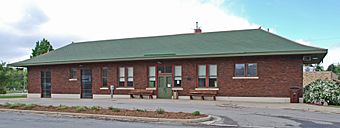Pere Marquette Railway Belding Depot facts for kids
Quick facts for kids |
|
|
Pere Marquette Railway Belding Depot
|
|
 |
|
| Location | 100 Depot St., Belding, Michigan |
|---|---|
| Area | less than one acre |
| Built | 1920 |
| Architectural style | hipped roof railroad depot |
| NRHP reference No. | 97000282 |
| Added to NRHP | March 28, 1997 |
The Pere Marquette Railway Belding Depot is an old train station located in Belding, Michigan. It was built in 1920 and is now a special historic place. In 1997, it was added to the National Register of Historic Places. Today, the city of Belding owns and uses this building.
Contents
A Look Back: The Depot's Story
Belding started as a small village in 1839. It stayed tiny until 1871 when a sawmill was built. Soon after, a railroad line was built to serve the village. This line first carried only goods.
Trains Arrive in Belding
In 1888, the Belding brothers opened their famous silk mills. This brought more people and business to the town. Because of this, a train station for passengers was built. In 1899, several railroads joined together to form the Pere Marquette Railway. This new company then ran the train line through Belding.
A New Station and Changing Times
The original train station was replaced in 1920 by the building you see today. For a while, many people used the station to travel. However, Belding's silk industry faced problems in the 1930s. This meant fewer people needed to travel by train.
In 1941, the railway stopped offering passenger service to Belding. The building was then used for storage for many years.
The Depot Today
In 1994, the city of Belding decided to fix up the old station. They made it into a place for the city council to meet. It also serves as a transit center for local transportation.
What Does the Depot Look Like?
The Pere Marquette Railway Belding Depot is a long, one-story building. It is made of reddish-brown bricks. The roof is low and shaped like a hip, meaning it slopes down on all four sides. The roof also has parts that hang over the sides, called eaves.
Inside the Station
On the side facing the train tracks, there's a part of the roof that sticks out. This area used to be the ticket and telegraph office. The main door for visitors is on the street side. This door leads into what was once the waiting room. The building also had a separate waiting room just for women, which is now a break room.
 | William L. Dawson |
 | W. E. B. Du Bois |
 | Harry Belafonte |



